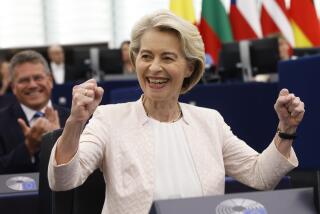Yeltsin Ally Is Elected Speaker of Upper House : Russia: Shumeiko’s victory indicates that the new Parliament will be more conciliatory than the one the president dissolved.
- Share via
MOSCOW — Lawmakers elected a close ally of President Boris N. Yeltsin as Speaker of Russia’s equivalent of the U.S. Senate on Thursday in a sign that the legislative body will be more conciliatory than the old Parliament, which Yeltsin dissolved in September.
First Deputy Prime Minister Vladimir F. Shumeiko, a former factory director whom Yeltsin has called on for such dirty tasks as closing down newspapers and seeking to ban opposition parties, won the Speaker’s post with 98 votes in the 178-seat Federation Council.
Shumeiko did not hide that he is the Russian president’s man, commenting, “It is unlikely that our relations will be complex--Boris Yeltsin and I share the same point of view.”
But in the Duma, the lower chamber of Russia’s new Parliament, it was a different story, with ultranationalist Vladimir V. Zhirinovsky turning the Speaker’s race there into a parliamentary circus. At one point, when Zhirinovsky was speaking and he was interrupted by noise from the hall, he exploded, “Shut up!”
When Deputy Prime Minister Anatoly B. Chubais pointed at his watch, indicating that time was up, Zhirinovsky shouted, “You’ll be showing your watch in your cell in Lefortovo (prison), Mr. Chubais!”
Zhirinovsky withdrew his candidacy for Speaker, although he had argued that because his party had won more votes than any other in Dec. 12 elections, the post should automatically be his. Instead, he said menacingly, he would wait for the 1996 presidential elections.
By day’s end, neither of the candidates left in the race--which continues today--was likely to please Yeltsin: One had led the Communist faction in the old Soviet legislature, the other was a champion weightlifter and writer who has undergone a vivid transformation from liberal to hard-line patriot.
But there was good news for the Russian president. In the official count of each faction’s membership, the pro-reform Russia’s Choice came out first with 76 deputies, the Itar-Tass news agency reported. The combined opposition of Communists and Zhirinovsky’s nationalists totaled only 163 seats, far from a majority in the 444-member body.
In the more decorous Federation Council, the battle over Shumeiko’s election laid bare the chamber’s main division: One camp tends toward supporting Moscow and the central government, while the other leans toward regional interests. Shumeiko’s rival, a factory chief from the Siberian city of Krasnoyarsk, trailed by only two votes in an earlier round of voting.
But Shumeiko observed: “We shall try not to let the elections result in a split of the chamber.”
Yeltsin accused the last Parliament of constantly acting to block his attempts at reforms and dissolved it on Sept. 21. When lawmakers armed themselves and opposed him, he brought in tanks and troops to clear their headquarters, the White House, in fighting that killed scores of people.
Nationwide balloting on Dec. 12 produced a new Russian constitution that gave the president more power and Parliament less. It also provided for a new Parliament, known as the Federal Assembly, with the Federation Council as its upper chamber and the Duma as the lower.
Shumeiko served as deputy Speaker in the old Parliament and was known as a relative moderate. After shifting from Parliament to the government, he was accused of corruption and suspended during an investigation, but beat back the charges.
The parliamentary races came amid jostling for government posts that, although going on behind the scenes, appeared at least as critical for Russia’s political future.
*
Yeltsin issued a decree on slashing the government Monday; since then, the fate of virtually all Russian ministers has been up in the air. Even economic mastermind Yegor T. Gaidar, who has plotted the course of Russia’s reforms, had no guarantee that he would remain a deputy prime minister, although Yeltsin has pledged that Gaidar would remain in the Cabinet.
Singled out by Russian media for probable axing was Finance Minister Boris G. Fyodorov, an adherent of Gaidar’s school of tight monetary policy. Although Yeltsin has vowed that reforms will continue, he has also indicated that the December election results convinced him that social spending must be increased, even if that means an increase in inflation.
From a group dominated by Gaidar’s team of young reformers, the Russian Cabinet appears likely to turn into more of a coalition government. Despite complaints from reformers, Prime Minister Viktor S. Chernomyrdin has said that he plans to retain Deputy Prime Minister Alexander Zaveryukha, who is aligned with the pro-Communist Agrarian Party and opposes Yeltsin’s land reform, in his post.
Chernomyrdin said that he would announce the members of the new Cabinet on Monday.
More to Read
Sign up for Essential California
The most important California stories and recommendations in your inbox every morning.
You may occasionally receive promotional content from the Los Angeles Times.













